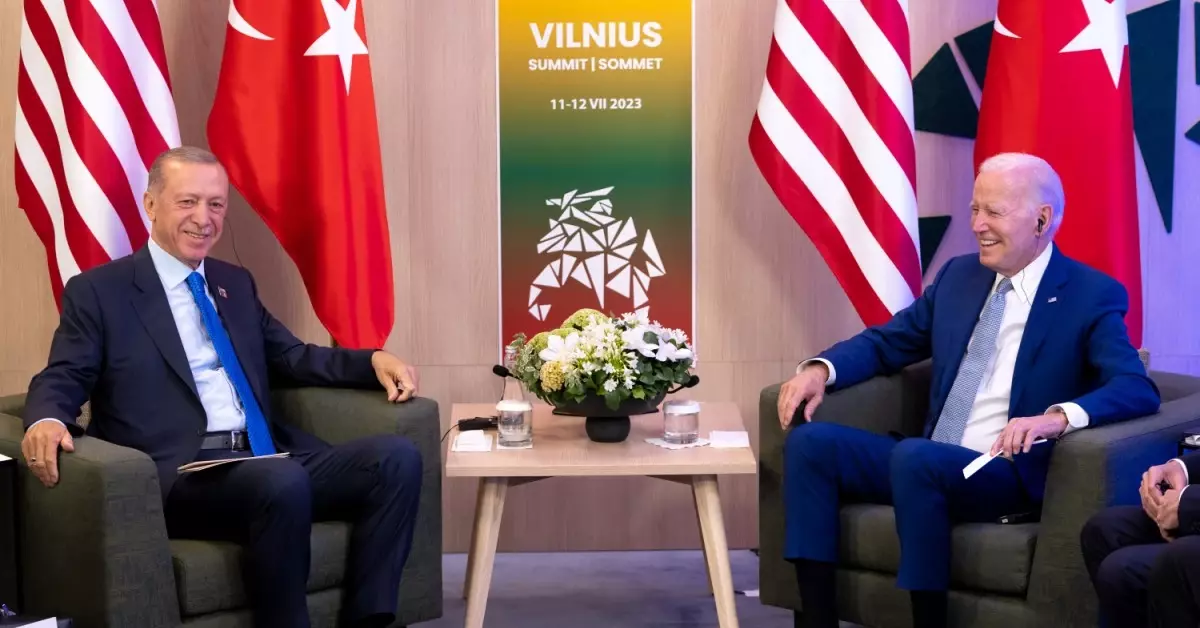Prez Joe Biden and Zelensky Navigate Ukraine’s Future at NATO Summit
VILNIUS, Lithuania − The NATO summit in Vilnius has become a pivotal moment for President Joe Biden, Russia, and Ukraine, as crucial decisions and tough choices loom over the gathering. With his reputation as a global leader on the line, Biden’s attendance carries immense significance.
Biden’s arrival at the summit was marked by controversy surrounding his decision to provide Ukraine with cluster munitions, which are banned by many NATO nations. The aim was to ensure Ukraine’s ammunition supply during its counteroffensive. However, this move has drawn criticism from some U.S. senators attending the summit, who urge Biden to rally NATO allies to increase defense spending.
One of the central dilemmas facing the alliance is whether to grant Ukraine membership in NATO. The absence of a clear framework has led Ukrainian President Volodymyr Zelensky to delay his participation until the last minute. Lithuania, a vulnerable former Soviet nation in the Baltic region, hosts the summit this week.
Zelensky expressed his frustration, highlighting the lack of readiness to invite Ukraine to NATO or make it a member of the alliance. This situation presents an opportunity for negotiations with Russia, wherein Ukraine’s NATO membership could become a bargaining chip. Zelensky warned that such reluctance only fuels Russia’s determination to continue its aggressive actions.
NATO later released a statement indicating that member countries would be in a position to extend an invitation to Ukraine once certain conditions are met. However, the statement lacked a specific timeline for membership and was criticized by Zelensky as unprecedented and absurd. He argued that the conditions for joining the alliance were too vague, emphasizing that uncertainty undermines strength.
Zelensky vowed to openly address these concerns at the summit, emphasizing the need for clarity and decisive action. The issue of Ukraine’s potential NATO membership has been a subject of intense debate and deliberation, with no easy resolution in sight.
As the summit progresses, the key question remains: Will Zelensky be able to convince NATO to offer Ukraine membership? In an impromptu meeting with NATO chief Jens Stoltenberg at the summit’s outset, Biden expressed support for the alliance’s intended stance on Ukraine’s future NATO membership. The joint defense council between NATO and Ukraine will be launched during the summit, but opinions within the alliance remain divided on the timing and method of extending a formal membership offer.
Julianne Smith, the U.S. ambassador to NATO, expressed optimism, believing that the final communique would reassure Zelensky. However, Zelensky’s concerns and expectations are high, as he seeks concrete steps toward NATO integration.
Another contentious issue revolves around Biden’s decision to supply Ukraine with cluster munitions, which has raised eyebrows among NATO allies. While many NATO nations have banned these weapons due to their potential harm to civilians, the United States and Ukraine are not bound by such restrictions. The use of cluster munitions by Russia in the conflict has further complicated the matter. Biden and his advisors defend this decision as a temporary measure to ensure Ukraine’s defense capabilities, while critics call for more aggressive military support, including the provision of tactical ballistic missiles and fighter jets.
Furthermore, a bipartisan group of senators at the summit is urging Biden to push NATO allies to increase their defense spending. A recent NATO report revealed that only 11 out of 31 member countries are meeting the commitment to spend 2% of their GDP on defense, although more countries are expected to reach this target by 2024. Biden supports the idea of treating 2% as a minimum benchmark for defense spending, and senators from both parties are reinforcing this message during the summit.
The summit also addresses the imperative of defending every inch of NATO territory, particularly in Eastern Europe. Nations like Lithuania, which already fulfills its defense spending commitments, are calling on wealthier NATO members to provide increased military and financial support to smaller Baltic states situated on Russia’s doorstep. Efforts are underway to strengthen the region’s defensive capabilities and address vulnerabilities arising from a more contested security environment.
The summit discussions are not confined solely to Ukraine and Russia. The situation in Belarus, which shares a border with Lithuania, has become a cause for concern. The possible influx of Wagner Group mercenaries and their leader, following the failed rebellion against Vladimir Putin, poses an additional threat in the region. Lithuania’s President Gitanas Nausėda urged NATO and the United States to prioritize the security of the region amidst Belarus’s alignment with Russia.
The summit witnessed a breakthrough regarding Sweden’s accession to NATO. Entry into the alliance requires unanimous approval, and Turkey had initially opposed Sweden’s membership. However, after extensive meetings between leaders, NATO Secretary-General Jens Stoltenberg announced that Sweden would become a full member. This positive development, with Turkey no longer opposed, paves the way for Hungary’s approval and expedites the membership process for Sweden.
As the NATO summit” progresses, the world watches with anticipation to see how these critical choices, Biden’s leadership, Zelensky’s expectations, and the future of Ukraine unfold amidst the geopolitical challenges faced by the alliance.
Here’s what to watch at this week’s NATO summit:
Zelensky’s NATO Membership Efforts:
During an unscheduled meeting with NATO chief Jens Stoltenberg, President Joe Biden expressed his support for Ukraine’s potential NATO membership. The alliance will launch a joint defense council with Ukraine, but there is a divergence of opinions among allies on extending a formal offer. Ukrainian President Volodymyr Zelensky has emphasized the need for a clear pathway to NATO membership.
Cluster Bombs and Fighter Jets:
President Biden’s decision to provide Ukraine with cluster munitions, banned by many NATO nations, has the potential to divide allies. While Russia, the United States, and Ukraine are not bound by the treaty prohibiting cluster munition use, other NATO countries are. Despite differences, NATO remains united, with no threat to alliance unity. Biden defends the decision as a temporary measure to safeguard Ukraine’s defense capabilities.
Push for Increased Defense Spending:
A bipartisan group of senators is urging Biden to press NATO allies to spend a higher proportion of their GDP on defense. Currently, only 11 out of 31 member countries meet the commitment to spend 2% of their annual GDP on defense. Biden supports treating the 2% benchmark as a minimum floor for spending and encourages allies to invest more. The senators met with Biden and received his support in their efforts.
Defense of NATO Territory:
Eastern European nations, such as Lithuania, are meeting their defense spending commitments, but their military expenditures are comparatively small compared to the United States. Lithuania calls on wealthier NATO members to increase military and financial support for Baltic states bordering Russia. Germany has already committed to deploying additional troops to Lithuania. The U.S. has stationed forces in Poland and is establishing a rotational brigade combat team in Romania to enhance defense capabilities.
Concerns about the Wagner Group:
The border between Lithuania and Belarus raises concerns as Belarus aligns more closely with Russia. Lithuania’s President Gitanas Nausėda highlighted the deteriorating regional situation, as Belarus becomes an additional factor of insecurity. The possible relocation of Wagner Group mercenaries to Belarus creates alarm in Eastern Europe. The evolving threat from Belarus is a significant topic of discussion at the summit.
Expansion of NATO with Sweden:
Turkey had been resisting Sweden’s accession into NATO, but a breakthrough occurred on the eve of the summit. After meetings with the leaders of both nations, NATO Secretary-General Jens Stoltenberg announced that Sweden would become a full member of the alliance. Hungary’s approval is still pending, but with Turkey’s opposition resolved, the process is expected to proceed smoothly.
The NATO summit in Vilnius holds tremendous significance as critical decisions are made to address Ukraine’s membership, defense spending, territorial defense, and the alliance’s expansion. The outcomes of these discussions will shape the future of NATO and the involved nations.

